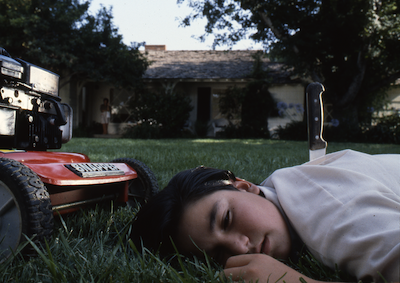Pictured above: Trevor (dir. Peggy Rajski, 1994)
The Archive has postponed in-person screenings in consideration of the current COVID-19 surge. This program has been rescheduled to Monday, March 7 at 7:30 p.m. We appreciate your understanding and support as we plan for a safer start to 2022.
Trevor
1994
There is one filmmaker who does not identify as queer represented in the Pioneers of Queer Cinema series, included due to the incredible impact their film (and personal activism and community alliance) has made on the entire LGBTQ+ community. Peggy Rajski’s Academy Award-winning debut film Trevor is a heartfelt and straightforward dark comedy that perfectly walks a fine line between darkness and a charming story of self-realization and advocacy.
Rajski (b. 1953) and co-producer Randy Stone conceived of the short film after seeing writer and performer James Lecesne portray the Diana Ross-loving character Trevor in his one-man show Word of Mouth. The short’s eponymous protagonist is a young theater and dance-loving teenage boy who comes to the realization (much to the chagrin of everyone around him) that he is gay. The resulting constant rejection and bullying leaves him with no alternative but to seriously consider taking his life.
When Rajski and the short’s other filmmakers went to look for a LGBTQ+ youth crisis organization they could place as a referral in the film’s closing credits, they were alarmed to see that no such nationwide hotline existed. Before the HBO debut of the film in 1998, The Trevor Project was created to rectify this egregious void as the country’s first and only 24/7 crisis intervention and suicide prevention hotline for LGBTQ+ youth. As discrimination, harassment and hate crimes rise due to the current political climate, the essential Trevor Project and other activist groups such as Dan Savage’s It Gets Better and the Human Rights Campaign serve a vital mission to give LGBTQ+ youth hope and show them a path forward. Peggy Rajski is currently the Dean of Loyola Marymount University’s School of Film and Television and also continues to serve on The Trevor Project’s Board of the Directors.
—Todd Wiener
35mm, color, 23 min. Director: Peggy Rajski. Screenwriter: James Lecesne. With: Brett Barsky, Judy Kain, John Lizzi, Johan Rooney, Stephen Tobolowsky.
Preservation funded by the David Bohnett Foundation, The Andrew J. Kuehn Jr. Foundation, and Outfest
Word is Out: Stories of Some of Our Lives
1977
In the mid-1970s, nearly 45 years ago, the Mariposa Film Group, a collective of six queer filmmakers (Peter Adair, Nancy Adair, Andrew Brown, Rob Epstein, Lucy Massie Phenix and Veronica Selver) traveled around the country, interviewing more than two dozen men and women of various backgrounds, ages and races to talk plainly and directly to the camera about their lives as gay men and lesbians. As David Dunlop wrote in the New York Times in 1996: "Understated though it was, Word is Out had a remarkable impact, coming at a time when images of homosexuals as everyday people, as opposed to psychopaths or eccentrics, were rare.” This groundbreaking landmark of a film is a true time capsule of an era when each individual’s participation was an act of courage. Also, it comes from a time when humans lived in a world without the omnipresent and omnivorous social media existing today, so there is a refreshing innocence and non-performative quality to the interviews. This iconic work was virtually lost at one point, with only a scratchy, dirty print, with whole scenes missing, known to exist. It has since been lovingly restored to its original glory and offers a not-to-be-missed experience.
—Bob Hawk
35mm, color, 124 min. Directors: Peter Adair, Nancy Adair, Andrew Brown, Robert Epstein, Lucy Massie Phenix, Veronica Selver. With: Pat Bond, John Burnside, Sally M. Gearhart, Elsa Gidlow, Donald Hackett. Preserved by the UCLA Film & Television Archive.






 Mobile Navigation
Mobile Navigation

